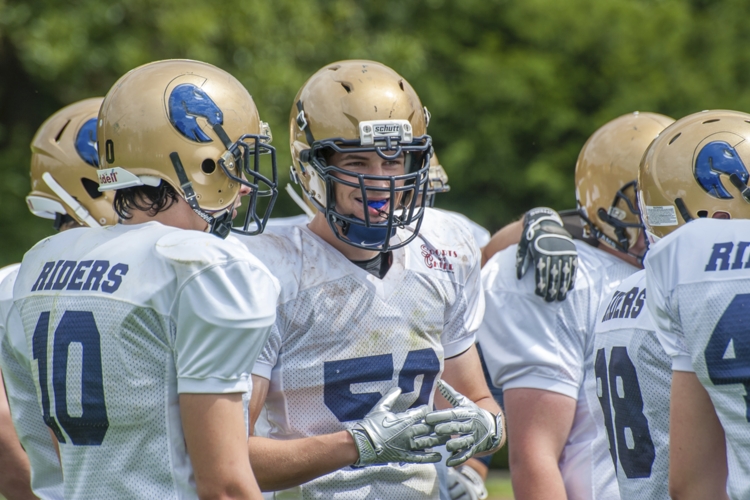How Sports Leadership Skills Benefit On and Off the Field

What is a Leader
A leader is simply a person who leads. To be a leader is to influence someone to go with you on a specific journey that they might not otherwise pursue. Leaders inspire and build confidence in those who follow them. Think of a conductor as a leader of a music group who instructs musicians when to start and stop, and at which tempo to proceed.
Often, a leader comes first in line and gets lots of the attention, but they wouldn’t be noticed at all if it weren’t for the followers. There’s a symbiotic relationship between leaders and followers: they each need a particular set of skills to fulfill their role and be effective. Often the best leaders have also learned how to be intelligent followers first. The same is true when it comes to sports leadership skills.
What Does it Mean to Lead in Sports
Leadership is necessary if any sports team expects to see success. We’ve all seen youth sports that lack leadership — it’s tough to watch them play. A team with a great coach can reach moderate success, but the most successful teams are those in which players lead. Coaches who model great leadership empower their athletes to also lead.
Bad teams, no one leads.
Average teams, coaches lead.
But elite teams, players lead.
PJ Fleck
There are two types of student leadership in sports: those who are appointed as leaders (e.g. team captain or assistant captain) and those who lead through social interactions and an innate ability to influence their teammates. Most findings show that these “unofficial” leaders are often more effective than appointed leaders. Often the appointed leaders are great at tactical decisions like what play to make when and by whom, whereas the unofficial leaders help boost team morale, strengthen relationships on the team, and diffuse social tension. (Learn more here if you want to play college sports.)
What Skills Does Sports Develop
Sports can teach a student a wide variety of skills that will help them move forward on the field and in life. Below are just a few:
Self-Management
Sports teaches you how to have a healthy attitude toward self and a strong management of your feelings. To win, you must learn to channel frustrations or losses into motivation to learn, grow, and change. Being on a well-lit field with a full audience of adults and peers pushes you to perform at your highest standard. You don’t have time to second guess — you learn how to make quick decisions and how to follow through on them without overthinking.
Character
On the field, you must learn to manage change and failure as well as your successes. Keep your attitude positive, your teammates encouraged, and work together to bring about the goals your team desires. This means putting team wins above the personal wins. We > Me! Off the field, you must stay in shape, train, and learn how to play your sport, even when no one is watching.
Character is something defined as what you do when no one else is with you, and only you know what you have decided to do. Character is also displayed when you do not do what others with you are doing when they are making poor choices. True character and leadership go together.
Perseverance
You won’t always win. You won’t always play perfectly. When you can figure out a way to keep going, despite the challenges, you’ve already won, even if haven’t prevailed on the scoreboard. Success is in the ability to work through those challenges and enjoy the journey. In spite of the outcome, the discipline, grit, and teamwork, you develop by leading (or following!) will set the foundation for even greater success outside of sport.
You can’t play every position at once if you are playing a team sport. You have a specific role to fulfill, and your teammates depend on you to perform that role to the best of your ability. Your audience does as well — they show up to watch you play and someone keeps the score. If you don’t play your part, lots of people notice and will push you to do better.
But you need not focus on becoming the most valuable player, rather set a goal to become the most valuable teammate. Show up, do your best. The great Coach John Wooden defined success as “the self-satisfaction that comes from doing your best to become the best you are capable of becoming.” The ultimate accountability lies within you. Look into the mirror and ask: Did the person you see there do their best?
Conflict Resolution
When you have an off game or a teammate fails on a play, teammates can get frustrated. A good leader will have a conversation about it later and figure out a way to move forward together. Not only can you have those hard conversations, but you can also accept criticism more readily, too. (Learn more about a team mentality here.)
How Sports Leadership Skills Can Benefit Over a Lifetime
We’ve all seen male student athletes move on and succeed in other areas of life. But a large percentage of women who play student sports earn their way to leadership positions in their post-graduate vocation. An ESPN survey found:
- 94% of women in the C-suite played sports
- 74% of surveyed women executives said a background in sports can help accelerate a woman’s career
- 61% said student sports contributed to their career success
- 52% of women in the C-suite played at the university level and 77% of these women think women who played sports make good employees
Every single skill listed above will set you apart in the business world, regardless of gender. When you play sports and embody these skillsets, the mentality sticks with you for a lifetime. Your ability to be a team player will make you a more effective, higher performing, and higher value employee.
Play hard, learn to lead, and work as a team. Students who excel in sports are well setup to succeed in many areas of life. If you’re unsure of your career choice but want to start career planning while still in high school, check out this post!
